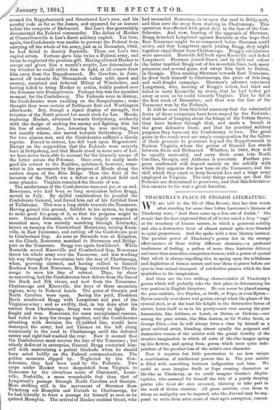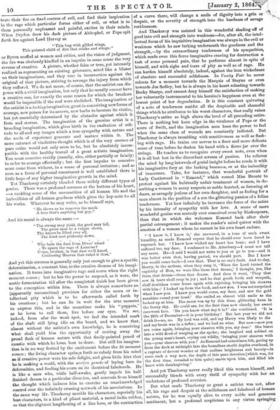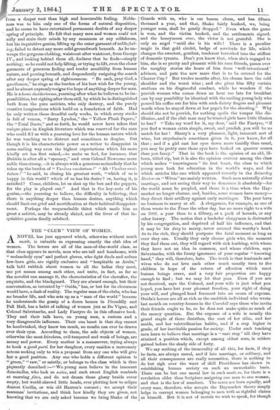THACKERAY'S PLACE IN ENGLISH LITERATURE.
WE are told in the life of Miss Bronte, that her first words after standing for some time before Lawrence's likeness of Thackeray were, " And there came up a lion out of Judah." She meant that the face expressed first of all to her mind a deep " rage" at the treachery of human nature, in which a generous nobility and also a destructive fever of almost animal spite were blended in equal proportions. And she spoke with a true literary instinct. The peculiar power of Thackeray's genius lies in the strange effervescence of these widely different elements,—a profound tenderness of feeling, a pathos of more thau feminine delicacy and more than masculine comprehensiveness, with a power of cynical fury which is always impelling him to spring upon the selfishmiss and duplicities of human nature and tear them to pieces before our eyes in that animal transport of retributive passion which the lion symbolizes to the imagination.
And these are the two striking characteristics of Thackeray's genius which will probably take the first place in determining his true position in English literature. He can never be placed among the pure satirists, like Dryden, or Swift, or Pope, or even Byron— Byron scarcely ever shows real genius, except when the gleam of the cynical steel, or at the least his delight in the destructive forces of nature, bares itself to us in his poetry—nor ever among the pure humourists, like Addison, or Lamb, or Sterne, or Dickens,—nor among the pure artists, like Miss Austen, or Sir Walter Scott, or George Eliot,—but he will always form a class by himself as a great satirical artist, blending almost equally the poignant and destructive venom of the satirist with the genial fertility of the creative imagination in which all sorts of life-like images spring up like flowers, and spring from germs which seem quite inde- pendent of the peculiar bias of the artist's own character.
Now it requires but little penetration to see how unique a combination of intellectual powas this is. The pure satirist is filled with something between indignation and hate. We could as soon imagine Swift or Pope creating characters as life-like as Thackeray, as we could imagine Goethe's Mephis- topheles, who assumed for himself the title of a purely denying genius (der Geist der stets verneint), claiming to take part in the work of divine creation. All great satirists, even those to whom no malignity can be imputed, who like Juvenal may be sup- posed to write from utter scorn of their age's corruption, concen-
trate their fire on fixed centres of evil, and find their inspiration in the rage which particular forms either of evil, or what is to them personally unpleasant and painful, excites in their minds. When Dryden drew his dark picture of Ahitophel, or Pope spit forth fire against Lord Hervey as
"This bug with gilded wings,
This painted child of dirt that stinks and stings;"
'or Byron scoffed at women and critics, and the vision of judgment, the fire was obviously kindled in an impulse in some sense the very reverse of creative. A picture, whether false or true, yet intensely realized as representing an existing grievance, acted like a blister on their imaginations, and they rose in insurrection against the -original of that picture, striving to revenge the injury from which they suffered. We do not mean, of course, that the satirist can dis- psnse with a vivid imagination, but only that he usually cannot have a creative one, for exactly the same reason for which the breakers would be impossible if the reef were abolished. The imagination of the satirist is a lashing imagination, great in conceiving new forms of scourge, new poison for its arrows, new barbs to lacerate its victim, but yet essentially determined by the obstacles against which it frets and storms. The imagination of the genuine artist is a brooding imagination, which gives birth in the exaltation of soli- tude to all and any images which a true sympathy with nature and the seeds of experience generate and mature within it. The mere cataract of vindictive thought which is of the very essence of pure satire would not only seem to be, but be absolutely incom- patible with the healthy travail of a great artistic imagination. You must conceive vividly (usually, also, either partially or falsely) in order to scourge effectually; but the first impulse to conceive must come from without, in a sense of personal irritation ; and so soon as a focus of personal resentment is well established there is little hope of any higher imaginative growth in the mind.
Yet Thackeray certainly blended these widely different types of genius. There was a profound soreness at the bottom of his heart, —a rankling sense of the unveracities of all human life and the imbecilities of all human goodness which gives the key-note to all his works. Whatever he may write, as he himself says,
" He shows as he removes the mask A face that's anything but gay."
And his moral is always the same :— " The strong may yield, the good may fall, The great man bo a vulgar clown, Tho knave be lifted over all,
The kind cast pitilessly down.
Who bade the dust from Dives' wheel . To spurn the rags of Lazarus ?
Come, brother, in that dust we'll kneel, Confessing Heaven that ruled it thus."
of a curve there, will change a smile of dignity into a grin or despair, or the severity of strength into the hardness of savage recklessness.
And Thackeray was assisted in this wonderful shading off of good into evil and strength into weakness—for, after all, the intel- lectual focus of his inquisitive imagination was always in the evil or weakness which he saw lurking underneath the goodness and the strength,—by the extraordinary tenderness of his sympathies, which made even this fierce imaginative craving for destruction a task of some personal pain, that he performs almost in spite of himself, and with sighs and tears of pity as well as of rage. He can harden himself absolutely, indeed, against the iron wickedness of absolute and successful selfishness. In Vanity Fair he never relents for a moment towards the Marquis of Steyne or even
towards Jos Sedley, but he is always in his heart relenting towards Becky Sharpe, and cannot deny himself the satisfaction of making her voluntarily instrumental to his heroine's happiness even at the lowest point of her degradation. It is this constant quivering of a note of tenderness amidst all the despicable and shameful things which he attributes to his worst characters, that really raises Thackeray's satire so high above the level of all preceding satire. There is nothing but keen edge in the virulence of Pope or the scorn of Swift, and the imagination soon loses the power to feel when the same class of wounds are constantly inflicted. But Thackeray is always trembling with sensitiveness as well as flash- ing with rage. He trains our nerves to a finer and more delicate sense of tune before he dashes his hand with a fierce jar over the strings. He teaches us to recognize every sweet note, even when it is all but lost in the discordant scream of passion. He relieves the mind by long intervals of genial insight before he rends it with his imaginative fury at the lurking baseness, or at the imbecility of innocence. Take, for instance, that wonderful portrait of Lady Castlewood in " Esmond," which roused Miss Broad to protest against his habitually unfair treatment of women, in de- scribing a woman in many respects so noble hearted, as listening at doors, as savagely jealous of her own daughter, and as feeling for a man almost in the position of a son the glittering passion of a feline tenderness. Yet how infinitely he increases the force of the satire by his intensity of sympathy with her love. A scene of more wonderful genius was scarcely ever conceived even by Shakespeare, than that in which she welcomes Esmond back after their partial estrangement ; it makes the reader's mind quiver with the emotion of a woman whom he cannot in his own heart endure.
know it, I know it,' she answered, in a tone of such sweet humility, as made Esmond repent that he should ever have dared to reproach her. I know how wicked my heart has been ; and I have suffered too, my dear. I confessed to Mr. Atterbury—I must not tell any more. He—I said I would not write to you or go to you—and it was better even that, having parted, we should part. But I knew you would come back—I own that. That is no one's fault. And to-day, Henry, in the anthem, when they sang it, 'When the Lord turned the captivity of Zion, we were like them that dream,' I thought, yes, like them that dream—them that dream. And then it went, 'They that sow in tears shall reap in joy ; and he that goeth forth and weepeth, shall doubtless come home again with rejoicing, bringing his sheaves with him ;' I looked up from the book, and saw you. I was not surprised when I saw you. I knew you would come, my dear, and saw the gold sunshine round your head.' She smiled an almost wild smile as she looked up at him. The moon was up by this time, glittering keen in the frosty sky. He could see, for the first time now clearly, her sweet careworn face. 'Do you know what day it is?' she continued. 'It is the 29th of December—it is your birthday ! But last year we did not drink it—no, no. My lord was cold, and my Harry was likely to die and my brain was in a feller; and we had no wine. But now—now you are come again, bringing your sheaves with you, my dear.' She burst into a wild flood of weeping as she spoke ; she laughed and sobbed on the young man's heart, crying out wildly, bringing your sheaves with you—your sheaves with you!' As Esmond had sometimes felt, gazing up from the deck at midnight into the boundless starlit depths overhead, -in a rapture of devout wonder at that endless brightness and beauty—in some such a way now, the depth of this pure devotion (which was, for the first time, revealed to him quite) smote upon him, and filled his heart with thanksgiving."
And yet Thackeray never really liked this woman himself, and successfully blends with every thrill of sympathy with her an undertone of profound aversion.
But what made Thackeray so great a satirist was not, after all, his rage and despair at the selfishness and falsehood of human nature, for he was equally alive to every noble and generous sentiment, but a profound scepticism in any virtue springing from a deeper root than high and honourable feeling. Noble- ness was to him only one of the forms of natural disposition, and he seems to have entertained permanent doubts of any deeper , spring of principle. He felt that many men and women could not sully and stain their minds by any meanness or any selfishness, but his inquisitive genius, lifting up the outer garment of noblefeel- ing, failed to detect any more solid groundwork beneath. As he un- wraps the gorgeous clothing, waistcoat after waistcoat, from George IV., and looking behind them all, declares that he finds—simply nothing; so he could not help lifting, or trying to lift, even the closer garments of generous feeling and tender sensibility from human nature, and peering beneath, and despondently resigning the search after any deeper spring of righteousness. " Be each, pray God, a gentleman," he sings as the burden of his best wish for the young, and he almost expressly resigns the hope of anything deeper for man. He is a home desideriorum, yearning after what he believes to be im- possibilities, but sighing after them still, by which he is distinguished both from the pure satirists, who only destroy, and the purely creative imaginations which build on a foundation of faith. Had he only written those dreadful early works, in which every stroke is full of venom, "Barry Lyndon," the " Yellow Plush Papers," the "Fatal Boots," and so forth, he would never have taken that unique place in English literature which was reserved for the man who could fill us with a yearning love for the human nature which he was teaching us to distrust and sometimes to despise. But though it is his characteristic power as a writer to disappoint in some smiling way even the highest expectations which his more kindly art has first raised,—to make us feel, for instance, that Dobbin is after all a " spooney," and even Colonel Newcome more noble than strong, —it is always with a generous melancholy that he takes up the burden of " Vanitas vanitatum " Ah Vanitas vani- &tam I' " he said, in closing his greatest work, " which of us is happy in this world? which of us has his desire? or, having it, is satisfied? Come, children, let us shut up the box and the puppets, for the play is played out." And that is the key-note of his genius,—the yearning to believe, the difficulty in believing, that there is anything deeper than human desires, anything which should limit our grief and mortification at their habitual disappoint- ment. Perhaps the unquenchable thirst which made him so great a satirist, may be already slaked, and the fever of that in- quisitive genius finally subdued.


















































 Previous page
Previous page